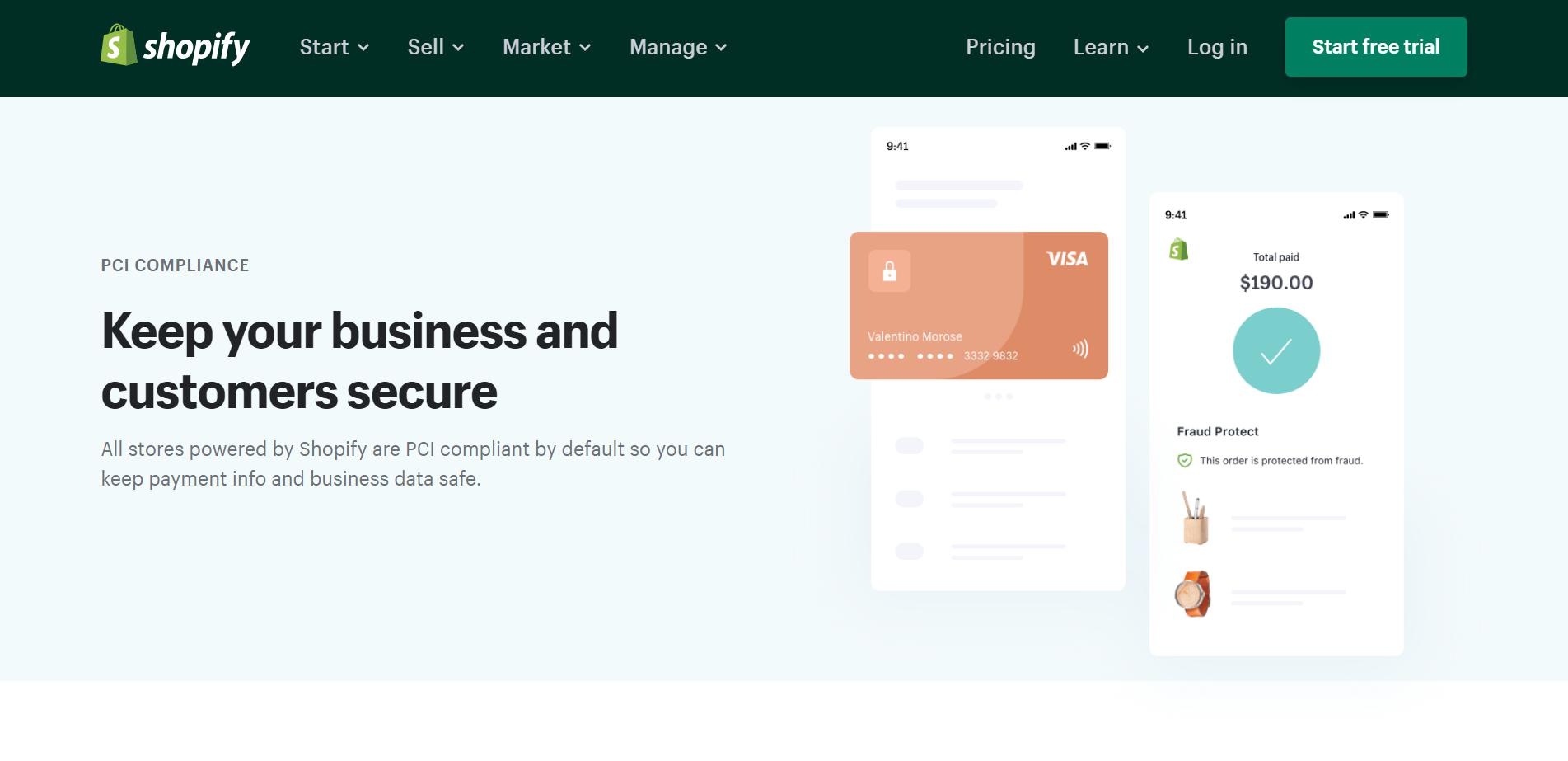Shopify is both PCI compliant and PCI certified. It meets all the necessary standards for secure payment processing.
Shopify ensures a secure environment for online transactions. PCI compliance means Shopify adheres to Payment Card Industry Data Security Standards (PCI DSS). These standards protect cardholder data and prevent fraud. Shopify’s PCI certification proves its adherence to these stringent security measures.
This certification is crucial for businesses handling sensitive payment information. It builds trust with customers, knowing their data is safe. Shopify’s dedication to security helps merchants focus on growing their business. With PCI compliance and certification, Shopify provides a reliable platform for e-commerce operations. Businesses can confidently use Shopify, knowing it meets top security standards.

Credit: www.shopify.com
Pci Compliance Basics
Shopify is a well-known eCommerce platform. Many businesses trust it to handle their online stores. A key concern for any business is security. One common question is about Shopify’s PCI compliance status. Let’s dive into the details.
Pci Compliance Vs. Pci Certification
PCI Compliance and PCI Certification are often confused. They are not the same. PCI Compliance means following specific security standards. These standards protect card data. PCI Certification means a formal approval by an auditing body. This shows a platform meets all PCI standards.
Shopify’s Certification Details
Shopify is PCI DSS Level 1 certified. This is the highest level of certification. It means Shopify meets strict security requirements. These requirements protect card data from theft and fraud.
The table below shows Shopify’s key compliance details:
| Compliance Aspect | Details |
|---|---|
| Certification Level | PCI DSS Level 1 |
| Security Measures | Encryption, Network Monitoring |
| Assessment Frequency | Annual |
| Audit Body | Qualified Security Assessor (QSA) |
By being PCI DSS Level 1 certified, Shopify ensures a high level of security. This helps build trust with its users. It also means businesses on Shopify can feel secure about their transactions.
- Data is encrypted during transmission.
- Regular security assessments are conducted.
- Continuous network monitoring is in place.
These measures make Shopify a reliable choice for online businesses. You can focus on growing your business. Shopify takes care of your data security.

Credit: socialhead.io
Shopify’s Compliance Status
Shopify ensures robust security for its users and their customers. It implements multiple security measures to protect sensitive information. These measures help in maintaining PCI compliance and PCI certification.
Data Encryption
Shopify uses SSL encryption for secure data transfer. This encryption protects data between the user’s browser and Shopify servers. SSL encryption ensures that sensitive data remains confidential. This includes credit card details and personal information.
Shopify employs AES-256 encryption for stored data. AES-256 is one of the strongest encryption standards available. This ensures that stored data remains secure from unauthorized access.
Secure Payment Processing
Shopify supports secure payment gateways to handle transactions. These gateways comply with PCI DSS standards. This ensures that payment processing is safe and secure.
Shopify itself is PCI DSS Level 1 certified. This is the highest level of PCI compliance. This certification means Shopify meets strict security standards for handling credit card information.
Below is a table summarizing some of the key security measures:
| Security Measure | Description |
|---|---|
| SSL Encryption | Secures data transfer between browser and server. |
| AES-256 Encryption | Protects stored data from unauthorized access. |
| PCI DSS Level 1 Certification | Ensures highest level of payment security standards. |
Shopify partners with trusted payment providers. This adds an extra layer of security for payment processing. Fraud detection tools are also in place to monitor transactions. This helps in identifying and preventing fraudulent activities.
Security Measures In Shopify
Shopify is PCI compliant, but merchants also have responsibilities. Understanding these duties is crucial for maintaining secure transactions and protecting customer data.
Shared Responsibility Model
Shopify follows a shared responsibility model. While Shopify handles much of the security, merchants must also play their part. Here are some key points:
- Shopify manages the security of their platform.
- Merchants are responsible for securely handling customer data.
- Merchants must ensure that their storefront is secure.
Maintaining Compliance
Merchants need to take specific steps to maintain PCI compliance:
- Secure Payment Methods: Use Shopify’s secure payment gateways.
- Regularly Update Software: Ensure all plugins and themes are up-to-date.
- Encrypt Data: Use SSL certificates to encrypt customer data.
- Monitor Transactions: Regularly check for fraudulent activities.
Merchants should also perform regular security audits. This helps in identifying potential vulnerabilities.

Credit: liquify.design
Merchant Responsibilities
Using a PCI compliant platform offers numerous advantages. It ensures customer trust and reduces data breach risks.
Customer Trust
Customer trust is vital for any online business. A PCI compliant platform assures customers that their data is safe. This trust can lead to more sales and repeat business. Customers prefer to shop on secure websites. They feel confident entering their payment details.
Reduced Risk Of Data Breaches
Data breaches can harm businesses. A PCI compliant platform helps reduce these risks. It follows strict security standards. These standards protect sensitive information. This protection can save businesses from costly data breaches. It ensures the safety of both company and customer data.
Frequently Asked Questions
What Is Pci In Shopify?
PCI in Shopify stands for Payment Card Industry compliance. It ensures secure handling of credit card information. Shopify is PCI DSS Level 1 compliant, the highest standard. This protects customer data and builds trust.
What Is The Difference Between Pci Compliance And Pci Certification?
PCI compliance means meeting the Payment Card Industry standards. PCI certification involves a formal assessment and validation by an approved Qualified Security Assessor (QSA).
How Do I Know If My Website Is Pci Compliant?
Check your website’s PCI compliance by completing a self-assessment questionnaire. Use a trusted PCI scanning service. Ensure your website meets all PCI DSS requirements. Regularly update and maintain security protocols. Consult with a PCI compliance expert if unsure.
What Companies Have To Be Pci Compliant?
Any business that processes, stores, or transmits credit card information must be PCI compliant. This includes online and offline retailers, payment processors, and service providers.
Conclusion
Shopify ensures PCI compliance, keeping customer data secure. This builds trust and credibility for your online store. Regularly updated security measures protect against data breaches. Choosing Shopify means prioritizing safety and compliance. Stay confident knowing your business meets stringent PCI standards.
Embrace a secure platform and focus on growing your eCommerce success.